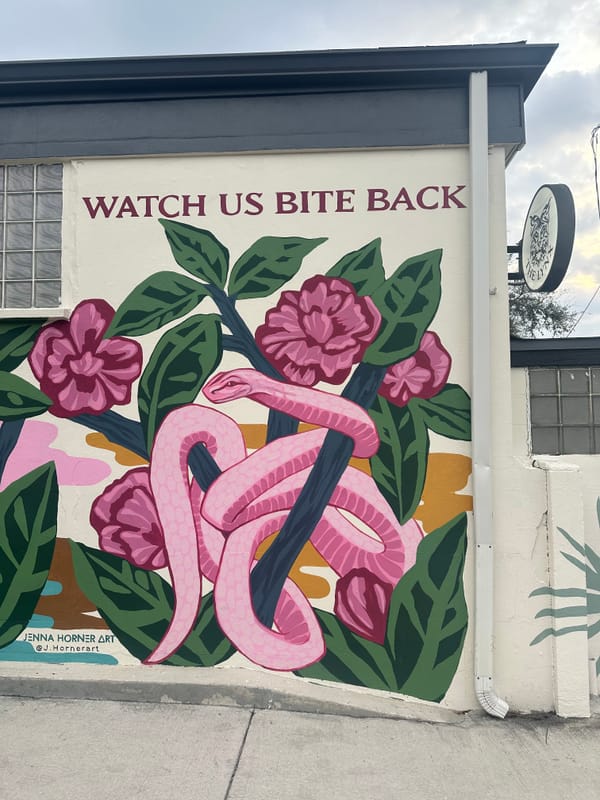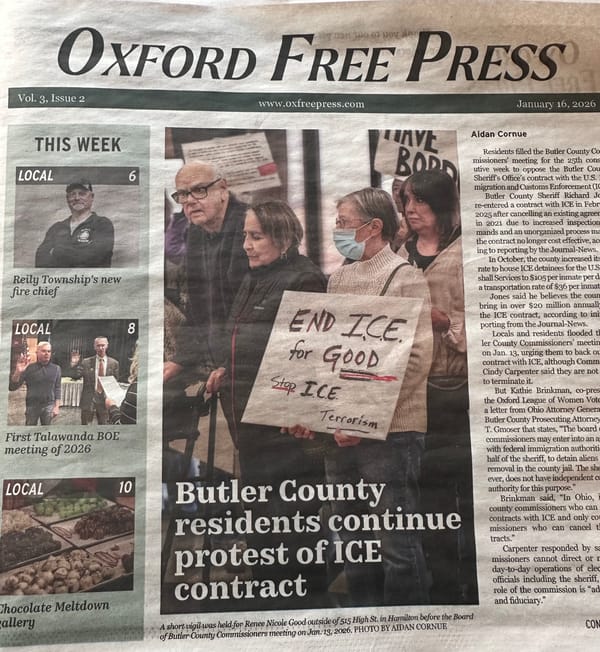Sunday Soul: Lament
The center of promise that was the United States of America is ended and broken. Lament is the task of this moment.
Stop, my girl. If you’re hurting, cry. - Layli Long Soldier
In 2020, Pádraig Ó Tuama, the host of the podcast "Poetry Unbound," released what I consider to be the most important analysis of any poem in the last decade. It was only fourteen minutes long. You can hear it or read the transcript here.
The poem was Layli Long Soldier's "Whereas my eyes land on the shoreline" a poem from her 2017 collection titled "WHEREAS." The poet explained her identity in the work's opening pages: "I am a citizen of the United States and an enrolled member of the Oglala Sioux Tribe, meaning I am a citizen of the Oglala Lakota Nation — and in this dual citizenship, I must work, I must eat, I must art, I must mother, I must friend, I must listen, I must observe, constantly I must live.”
The collection was a response to a 2009 apology to native peoples that was issued by President Obama. The title of the apology was thirty five words long ("A joint resolution to acknowledge a long history of official depredations and ill-conceived policies by the Federal Government regarding Indian tribes and offer an apology to all Native Peoples on behalf of the United States").
The apology was not given in person. There were no native peoples present when it was issued. Instead, it was buried in a budget resolution. Most native peoples never knew it existed.
Long Soldier's poetry collection engages with the language of the official apology. The official apology (I hesitate even to call it that) is amended with a long series of clauses that begin "Whereas," and it is from this repetition that Long Soldier takes the title of her book as well as the structure of it - each of the poems in the collection is a response to one of the clauses that begin "Whereas." In the poem in question, Long Soldier is responding to the clause: "Whereas the arrival of Europeans in North America opened a new chapter in the history of Native Peoples."
Pádraig Ó Tuama calls the poem "a profound poetic engagement with the quality of public language, which is ultimately what poetry is and it is ultimately also what politics is - the question of the quality of public language being used." In this, Long Soldier is an exemplar of the artist as dissident that I wrote about in my "Things you can do" post. I am pushed to ask myself, how might I engage with the quality of public language being used today?
The poem begins in a seemingly disconnected world. Long Soldier describes an event where her daughter is carried bleeding into the kitchen by friends. She doesn't understand why her own daughter doesn't cry, even though she is hurting. She corrects her:
"In our home in our family we are ourselves, real feelings. Be true."
At first, she assumes that this habit of hiding her true feelings has been learned from her daughter's friends. But then the poet recognizes from where her daughter learned not to cry when hurting. She reflects,
"Yet I’m serious when I say I laugh reading the phrase, 'opened a new chapter.' I can’t help my body.
"I shake. The realization that it took this phrase to show. My daughter’s quiver isn’t new— but a deep practice very old she’s watching me;"
Long Soldier realizes that her daughter learned not to tell the truth about her own suffering by watching her mother - her mother who laughs, rather than mourns, when she reads the official apology which suggests that the genocide of her people "opened a new chapter," in the United States, a euphemism so grotesque it is abusive in its construction.
Laughing when hurting is a common defense mechanism. I remember once in a therapy session with the incomparable Roberta Seldman (Rest in Glory) she pointed out that I had the same habit. "You've got to cut that out," she said sternly.
When I first heard the analysis of this poem, I was still processing my divorce from my son's father. What struck me about Pádraig Ó Tuama's analysis was how he used it to discuss lament as a practice. He wrote,
"She’s realizing that she’s hidden the pain, and I think this poem is proposing, also, that she’s allowed somebody else to tell her what the acceptable level of acknowledging that pain in public is like. She, in herself, and others too, it seems to be suggesting, have taken the idea of saying, “Put on a brave face. Don’t cry. Don’t do this. Don’t lament in that way, lament in this way. Don’t acknowledge in that way, lament in this way,” and that there’s a power of the censoring, and somehow, the editing about what lament for genocide should look like in public.
He continues, "And through the story of her daughter bleeding, she’s recognizing — and I think this poem is pushing to say, in light of this apology that was inept and ineffectual — actually, we and I and this poem are proclaiming lament. And the accusations that come from lament and the demand for acknowledgment that come from lament will be on our own terms and should not be dictated by somebody who wants you to laugh it off; put a brave face on it; move to quick apology; move to say, “Oh, but we’re all friends now, and we’re in the healing process.” This is saying, no, we haven’t even done step one. And I’m going to locate me back there, and I’m going to recognize that throughout generations, there has been this learned behavior of lament according to the terms by which lament will be acceptable. And that’s stopping."
Put simply, when something has been taken, the one who has suffered the loss gets to proclaim it however they damn well please. They don't have to rush to acceptance. They can take their time in the lament.
This censoring of lament resonated with my experience. In my situation my ex-husband wanted us to move immediately to niceties, politely discussing custody arrangements, but he refused to take responsibility for his behavior, how his choices had affected me and our son, and how the consequences of his decision would reverberate in our lives for decades. He wanted to skip steps and get to the part where we had a cordial relationship without going through the processing of our break-up, its causes and its consequences.
The healing process does not begin prior to lament or in the absence of lament. It begins after lament has come to its full expression. We are in a moment where those of us who mourn the loss of the safety of our international students, the loss of state capacity, the loss of our world-class university system, the loss of the ability of our country to collect taxes, to hold leaders accountable, to restrain security services, we are being told to get over it. We are being told that it's not that bad. We are being told to envision the new state that we might build. But things don't work that way. All of those tasks are secondary to lament. The task of this moment is lament.
A few weeks ago I mentioned the relevance of Biblical scholar Walter Brueggemann's Prophetic Imagination. When I revisited that text recently I was so struck by the centrality of grief to the process of envisioning a new reality. In his chapter on Jesus, Brueggemann remarks: "The grief of Jesus [over the city of Jerusalem in Luke 19], like the grief of Jeremiah... is that this center of promise is now ended and bankrupt." No one understood why Jesus was weeping over a city that still existed, but he foresaw the destruction that would come, and he mourned it openly and in his own way.
To paraphrase, the center of promise that was the United States of America is ended and broken. Lament is the task of this moment. Don't let anyone tell you what your grieving should look like.

